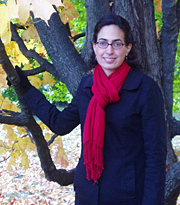- Number 307 |
- March 15, 2010
ARRA money funds young neutrino physicist’s research

Alysia Marino
Alysia Marino, a particle physicist supported by DOE’s Office of High Energy Physics, always knew she’d be a scientist of some kind. Still, it’s something of a happy accident she ended up in physics.
“I think I was too klutzy for chemistry and too squeamish to really cut things open,” she said. Physics required neither a steady hand nor a strong stomach, and so far the choice has proved a fruitful one.
Marino, assistant professor at the University of Colorado and a user of DOE’s Fermi National Accelerator Laboratory, was awarded a five-year, $750,000 early-career research grant from the Department of Energy, under the American Recovery and Reinvestment Act.
Marino will focus on long-baseline neutrino research—first, for Japan’s T2K experiment, then for Fermilab’s Long-Baseline Neutrino Experiment. For the LBNE, Marino will concentrate on neutrinos as they’re fresh out of their beam source and at the beginning of their journey through hundreds of kilometers of rock. In particular, Marino will investigate how to better measure the neutrinos’ fraternal twins—muons.
The New Jersey native first encountered particle physics as a Princeton undergrad studying rare kaon decay. “It was the first time I really learned about how you detect all these short-lived particles,” she said. She was hooked.
From kaons that disappear in the blink of an eye, Marino moved on to particles as hardy as a Galapagos tortoise, but far more difficult to see: neutrinos. The mysterious particles can traverse vast reaches of space and stream straight through the Earth, traveling long distances without a single interaction. By probing the neutrino beam along its journey, physicists can learn about neutrino mixing and find out whether neutrinos violate one of the fundamental matter-antimatter symmetries, also known as CP violation.
Marino pursued neutrino research through a Ph.D. at Berkeley, and post-doc positions at Fermilab’s MINOS neutrino experiment and at the University of Toronto, working on the T2K experiment. She began teaching at the University of Colorado in January 2009.
Marino is still not over the surprise of her recent award. You could hear a smile in her voice; she said, “It’s a very valuable thing to a young physicist trying to establish a research program.”
— Andrea Mustain, Fermi National Accelerator Laboratory
Submitted by DOE's Fermi National Accelerator Laboratory
